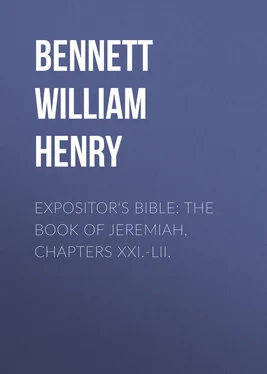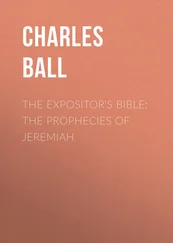William Bennett - Expositor's Bible - The Book of Jeremiah, Chapters XXI.-LII.
Здесь есть возможность читать онлайн «William Bennett - Expositor's Bible - The Book of Jeremiah, Chapters XXI.-LII.» — ознакомительный отрывок электронной книги совершенно бесплатно, а после прочтения отрывка купить полную версию. В некоторых случаях можно слушать аудио, скачать через торрент в формате fb2 и присутствует краткое содержание. Издательство: Иностранный паблик, Жанр: foreign_religion, foreign_antique, foreign_prose, на английском языке. Описание произведения, (предисловие) а так же отзывы посетителей доступны на портале библиотеки ЛибКат.
- Название:Expositor's Bible: The Book of Jeremiah, Chapters XXI.-LII.
- Автор:
- Издательство:Иностранный паблик
- Жанр:
- Год:неизвестен
- ISBN:нет данных
- Рейтинг книги:5 / 5. Голосов: 1
-
Избранное:Добавить в избранное
- Отзывы:
-
Ваша оценка:
- 100
- 1
- 2
- 3
- 4
- 5
Expositor's Bible: The Book of Jeremiah, Chapters XXI.-LII.: краткое содержание, описание и аннотация
Предлагаем к чтению аннотацию, описание, краткое содержание или предисловие (зависит от того, что написал сам автор книги «Expositor's Bible: The Book of Jeremiah, Chapters XXI.-LII.»). Если вы не нашли необходимую информацию о книге — напишите в комментариях, мы постараемся отыскать её.
Expositor's Bible: The Book of Jeremiah, Chapters XXI.-LII. — читать онлайн ознакомительный отрывок
Ниже представлен текст книги, разбитый по страницам. Система сохранения места последней прочитанной страницы, позволяет с удобством читать онлайн бесплатно книгу «Expositor's Bible: The Book of Jeremiah, Chapters XXI.-LII.», без необходимости каждый раз заново искать на чём Вы остановились. Поставьте закладку, и сможете в любой момент перейти на страницу, на которой закончили чтение.
Интервал:
Закладка:
The twelve years that intervened between Josiah's Reformation and his defeat at Megiddo were the happiest part of Jeremiah's ministry. It is not certain that any of the extant prophecies belong to this period. With Josiah on the throne and Deuteronomy accepted as the standard of the national life, the prophet felt absolved for a season from his mission to pluck up and break down, and perhaps began to indulge in hopes that the time had come to build and to plant. Yet it is difficult to believe that he had implicit confidence in the permanence of the Reformation or the influence of Deuteronomy. The silence of Isaiah and Jeremiah as to the ecclesiastical reforms of Hezekiah and Josiah stands in glaring contrast to the great importance attached to them by the Books of Kings and Chronicles. But, in any case, Jeremiah must have found life brighter and easier than in the reigns that followed. Probably, in these happier days, he was encouraged by the sympathy and devotion of disciples like Baruch and Ezekiel.
But Josiah's attempt to realise a Kingdom of God was short-lived; and, in a few months, Jeremiah saw the whole fabric swept away. The king was defeated and slain; and his religious policy was at once reversed either by a popular revolution or a court intrigue. The people of the land made Josiah's son Shallum king, under the name of Jehoahaz. This young prince of twenty-three only reigned three months, and was then deposed and carried into captivity by Pharaoh Necho; yet it is recorded of him, that he did evil in the sight of Jehovah, according to all that his fathers had done. 6 6 2 Kings xxiii. 30-32.
He – or, more probably, his ministers, especially the queen-mother 7 7 Cf. xxii. 26.
– must have been in a hurry to undo Josiah's work. Jeremiah utters no condemnation of Jehoahaz; he merely declares that the young king will never return from his exile, and bids the people lament over his captivity as a more grievous fate than the death of Josiah: —
"Weep not for the dead,
Neither lament over him:
But weep sore for him that goeth into captivity;
For he shall return no more,
Neither shall he behold his native land." 8 8 xxii. 10-12.
Ezekiel adds admiration to sympathy: Jehoahaz was a young lion skilled to catch the prey, he devoured men, the nations heard of him, he was taken in their pit, and they brought him with hooks into the land of Egypt. 9 9 Ezek. xix. 3, 4.
Jeremiah and Ezekiel could not but feel some tenderness towards the son of Josiah; and probably they had faith in his personal character, and believed that in time he would shake off the yoke of evil counsellors and follow in his father's footsteps. But any such hopes were promptly disappointed by Pharaoh Necho, and Jeremiah's spirit bowed beneath a new burden as he saw his country completely subservient to the dreaded influence of Egypt.
Thus, at the time when we take up the narrative, the government was in the hands of the party hostile to Jeremiah, and the king, Jehoiakim, seems to have been his personal enemy. Jeremiah himself was somewhere between forty and fifty years old, a solitary man without wife or child. His awful mission as the herald of ruin clouded his spirit with inevitable gloom. Men resented the stern sadness of his words and looks, and turned from him with aversion and dislike. His unpopularity had made him somewhat harsh; for intolerance is twice curst, in that it inoculates its victims with the virus of its own bitterness. His hopes and illusions lay behind him; he could only watch with melancholy pity the eager excitement of these stirring times. If he came across some group busily discussing the rout of the Egyptians at Carchemish, or the report that Nebuchadnezzar was posting in hot haste to Babylon, and wondering as to all that this might mean for Judah, his countrymen would turn to look with contemptuous curiosity at the bitter, disappointed man who had had his chance and failed, and now grudged them their prospect of renewed happiness and prosperity. Nevertheless Jeremiah's greatest work still lay before him. Jerusalem was past saving; but more was at stake than the existence of Judah and its capital. But for Jeremiah the religion of Jehovah might have perished with His Chosen People. It was his mission to save Revelation from the wreck of Israel. Humanly speaking, the religious future of the world depended upon this stern solitary prophet.
CHAPTER II
A TRIAL FOR HERESY
The date of this incident is given, somewhat vaguely, as the beginning of the reign of Jehoiakim. It was, therefore, earlier than b. c. 605, the point reached in the previous chapter. Jeremiah could offer no political resistance to Jehoiakim and his Egyptian suzerain; yet it was impossible for him to allow Josiah's policy to be reversed without a protest. Moreover, something, perhaps much, might yet be saved for Jehovah. The king, with his court and prophets and priests, was not everything. Jeremiah was only concerned with sanctuaries, ritual, and priesthoods as means to an end. For him the most important result of the work he had shared with Josiah was a pure and holy life for the nation and individuals. Renan – in some passages, for he is not always consistent – is inclined to minimise the significance of the change from Josiah to Jehoiakim; in fact, he writes very much as a cavalier might have done of the change from Cromwell to Charles II. Both the Jewish kings worshipped Jehovah, each in his own fashion: Josiah was inclined to a narrow puritan severity of a life; Jehoiakim was a liberal, practical man of the world. Probably this is a fair modern equivalent of the current estimate of the kings and their policy, especially on the part of Jehoiakim's friends; but then, as unhappily still in some quarters, "narrow puritan severity" was a convenient designation for a decent and honourable life, for a scrupulous and self-denying care for the welfare of others. Jeremiah dreaded a relapse into the old half-heathen ideas that Jehovah would be pleased with homage and service that satisfied Baal, Moloch, and Chemosh. Such a relapse would lower the ethical standard, and corrupt or even destroy any beginnings of spiritual life. Our English Restoration is an object-lesson as to the immoral effects of political and ecclesiastical reaction; if such things were done in sober England, what must have been possible to hot Eastern blood! In protesting against the attitude of Jehoiakim, Jeremiah would also seek to save the people from the evil effects of the king's policy. He knew from his own experience that a subject might trust and serve God with his whole heart, even when the king was false to Jehovah. What was possible for him was possible for others. He understood his countrymen too well to expect that the nation would continue to advance in paths of righteousness which its leaders and teachers had forsaken; but, scattered here and there through the mass of the people, was Isaiah's remnant, the seed of the New Israel, men and women to whom the Revelation of Jehovah had been the beginning of a higher life. He would not leave them without a word of counsel and encouragement.
At the command of Jehovah, Jeremiah appeared before the concourse of Jews, assembled at the Temple for some great fast or festival. No feast is expressly mentioned, but he is charged to address "all the cities of Judah" 10 10 The expression is curious; it usually means all the cities of Judah, except Jerusalem; the LXX. reading varies between "all the Jews" and "all Judah."
; all the outlying population would only meet at the Temple on some specially holy day. Such an occasion would naturally be chosen by Jeremiah for his deliverance, just as Christ availed Himself of the opportunities offered by the Passover and the Feast of Tabernacles, just as modern philanthropists seek to find a place for their favourite topics on the platform of May Meetings.
Интервал:
Закладка:
Похожие книги на «Expositor's Bible: The Book of Jeremiah, Chapters XXI.-LII.»
Представляем Вашему вниманию похожие книги на «Expositor's Bible: The Book of Jeremiah, Chapters XXI.-LII.» списком для выбора. Мы отобрали схожую по названию и смыслу литературу в надежде предоставить читателям больше вариантов отыскать новые, интересные, ещё непрочитанные произведения.
Обсуждение, отзывы о книге «Expositor's Bible: The Book of Jeremiah, Chapters XXI.-LII.» и просто собственные мнения читателей. Оставьте ваши комментарии, напишите, что Вы думаете о произведении, его смысле или главных героях. Укажите что конкретно понравилось, а что нет, и почему Вы так считаете.












